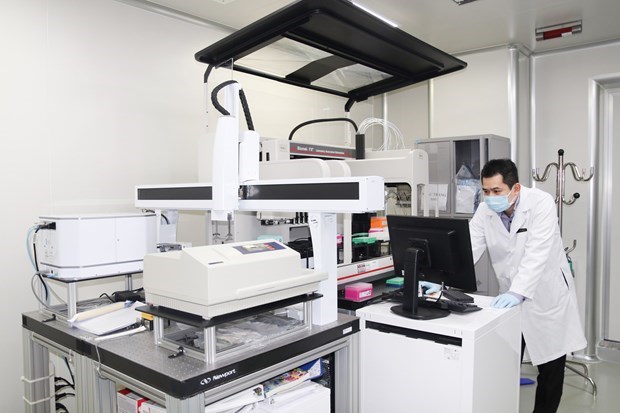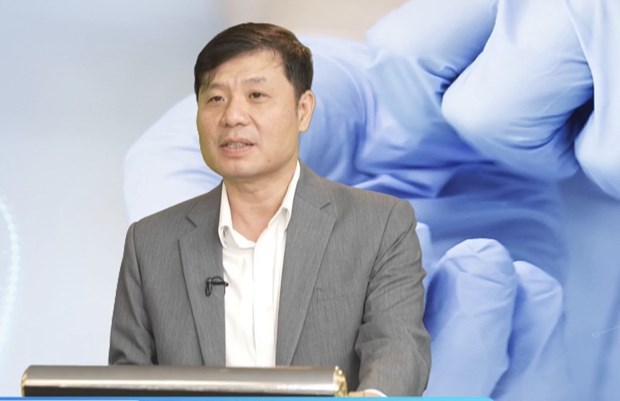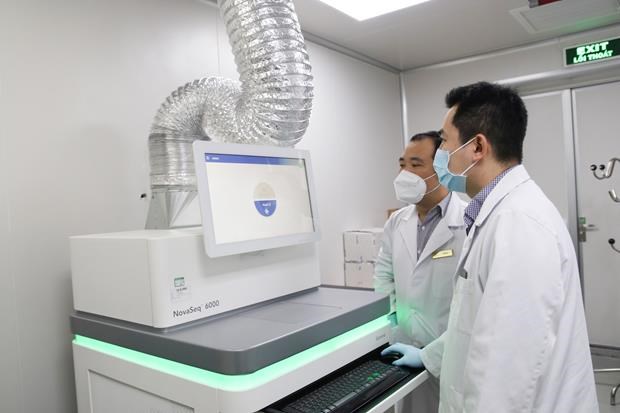Breakthrough in building genetic variation database of Vietnamese people
Over the past three years, researchers have decoded the entire genomes of more than 1,000 healthy adults aged between 35 and 55, with no blood relations.
 The project on building a genetic variation database of Vietnamese people has been completed. (Photo: VietnamPlus)
The project on building a genetic variation database of Vietnamese people has been completed. (Photo: VietnamPlus)Catching up with world’s precision medicine
Launched in late 2018, the project on building a genetic variation database of Vietnamese people has been completed by VinBigData of Vingroup. It is the largest of its kind in the country so far.
Professor Vu Ha Van, Scientific Director of VinBigData, said that in the past, doctors often used the “one therapy for many” treatment model, which means using the same therapy and medication with the same dosage for many patients with the same illnesses. However, it’s time to change our mindset and catch up with the world’s precision medicine by using customised therapies for different groups of patients, to improve treatment effectiveness.
He noted one condition for the success of precision medicine is that each country needs to have a database of typical genetic variations of its people, built based on strict, precise and large-scale studies.
In this project, scientists directly decoded the entire genomes of more than 1,000 healthy people, and analysed part of the genomes of over 4,000 cases, with common illnesses along with their drug responsiveness. This database is representative of Vietnamese people and matches the geographical and sex distributions of the population.
This research’s findings will generate great value for the community, he said.
 Professor Vu Ha Van, Scientific Director of VinBigData (Photo: VietnamPlus)
Professor Vu Ha Van, Scientific Director of VinBigData (Photo: VietnamPlus)Over the past three years, researchers have decoded the entire genomes of more than 1,000 healthy adults aged 35-55, without consanguinity and representing different demographic patterns. They also analysed part of the genomes of over 4,000 cases with common illnesses, along with their drug responsiveness.
Findings revealed over 40 million genetic variations, including nearly 2 million popular variations typical among the Vietnamese population.
This is both the first complete and the largest database of the entire genome of Vietnamese people, he said.
Part of the database has been opened up for the community to access via MASH Data Portal. Thanks to the database, domestic researchers can develop more precise and sensitive genetic analysis applications, promote preventive medicine, ease the burden of disease and reduce healthcare costs, according to the professor.
Helping increase precision in medical diagnosis
Deputy Minister of Science and Technology Bui The Duy said this project has contributed to medical, artificial and big data studies in Vietnam.
Appreciating the private sector’s engagement in the formation of big research databases, he expressed hope that the project will be an encouragement for many other parties to develop more databases, helping boost scientific and technological development in Vietnam and resolving problems facing the country.
 The genetic database of Vietnamese people is hoped to help promote the development of preventive and precision medicine. (Photo: VietnamPlus)
The genetic database of Vietnamese people is hoped to help promote the development of preventive and precision medicine. (Photo: VietnamPlus)He added the genetic database of Vietnamese people is hoped to be a prerequisite for promoting the development of preventive and precision medicine in the country, thereby helping improve community health.
Professor Nguyen Thanh Binh, Chairman of the Council of the Hanoi University of Pharmacy, held that the initial expenses of this project could be big, but with the optimisation of this database, disease treatment can be improved considerably in the future./.












